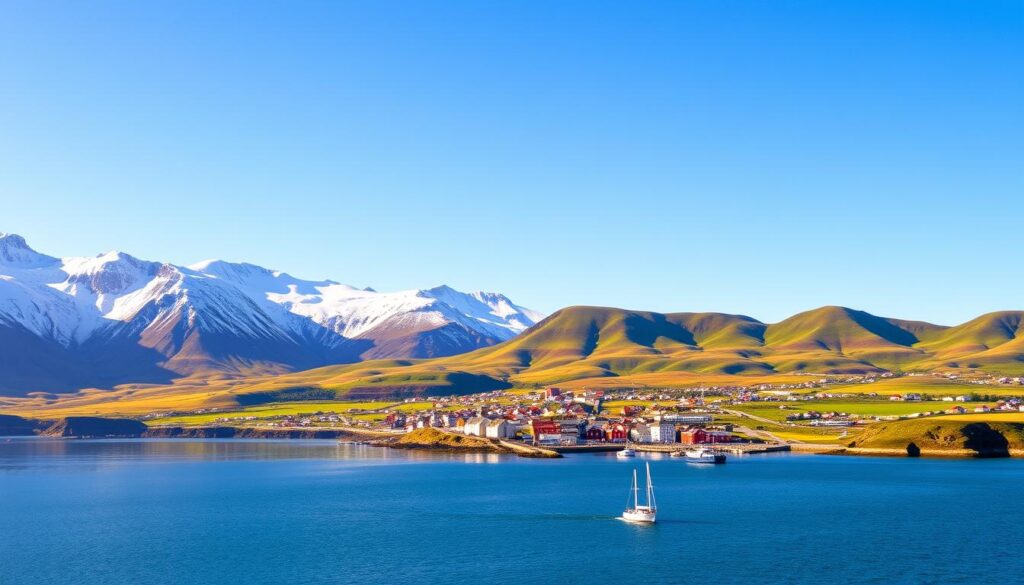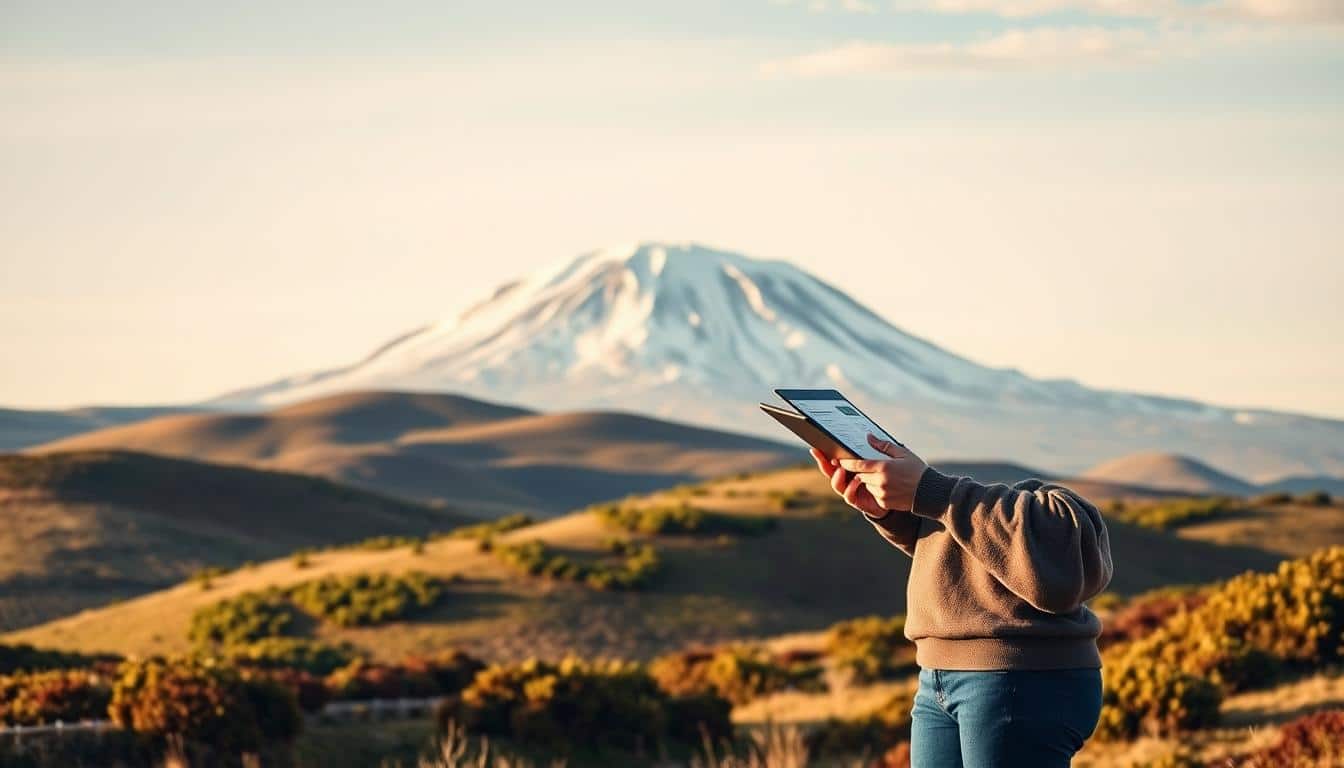Iceland’s financial scene is always changing. Investors need smart strategies that fit this unique market. This guide helps those in Iceland grow their wealth by understanding local investment chances.
We’ll spotlight key investment tips for making money and growing wealth. This will help Icelandic investors reach their money goals.
Anúncios
The Current State of the Icelandic Economy
The Icelandic economy is doing well, thanks to fisheries, tourism, and aluminum production. Each sector adds its own touch to the nation’s growth. This mix helps keep the economy stable and growing.
Overview of Key Economic Sectors
In 2023, Iceland’s economy kept growing despite worldwide changes. Fisheries are key, offering jobs and resources. Tourism is booming again, helping the economy after the pandemic. Aluminum production makes Iceland stand out globally.
Impact of Tourism on Wealth Growth
Tourism is very important for Iceland’s economy. In 2023, more than 2.2 million visitors came, and that number is expected to rise. This brings jobs and money to the people.
The government wants more foreign investment to make tourism and other areas even stronger. This could make the economy grow in a sustainable way.

Understanding Wealth Building Strategies
Wealth building means accumulating assets over time. It’s vital for Icelandic investors to master these strategies. This helps them increase their net worth and secure their financial future. It’s also key for navigating an ever-changing economy.
Definition and Importance of Wealth Building
Wealth building is all about managing your money to grow your wealth. It involves investing in things like real estate and stocks. This approach is key because it leads to financial freedom and a secure retirement. Understanding this helps Icelandic investors make smart choices for their financial future.
Diversifying Investment Portfolios
Diversification is key in creating strong investment portfolios. In Iceland, investors have many options across different sectors. This includes real estate and traditional investments like stocks and bonds. Delving into these areas helps lower risks and increase possible returns.
Real Estate Investment Opportunities in Iceland
Because of the booming tourism sector, real estate in Iceland is flourishing. High-end properties and luxury resorts are especially rewarding. A steady demand for places to stay boosts this sector’s appeal for long-term growth.
- Luxury properties tailored for tourists
- Commercial spaces with high rental yields
- Opportunities in residential developments to accommodate locals and visitors alike
Real estate investment is not just financially promising. It also lets investors be part of the expanding tourism and hospitality market.
Investing in Stocks and Bonds
The stock market in Iceland presents various opportunities for portfolio diversification. It features a wide selection of local companies. These appeal to the growing number of foreign investors. Stocks and bonds offer flexible options that suit different risk tolerances and goals. Key benefits include:
- Potential for capital gains through equities
- Stable income from bonds
- Access to local and international markets
Mixing real estate, stocks, and bonds in a portfolio can create financial stability. It allows investors to adjust as markets change.
Fixed Income Investments in Iceland
Investors seeking stability often choose fixed income investments. These provide a safer option, perfect for uncertain times. In Iceland, many fixed income investments fit both local and global investors aiming to balance their portfolios.
Advantages of Fixed Income Investments
These investments offer several benefits. They manage risk and ensure steady income. The main perks are:
- Stable returns, key for those avoiding risk.
- Protection during market swings, crucial in downturns.
- A chance to safeguard investments, attracting cautious investors.
Stefnir’s Approach to Investment Management
Stefnir, Iceland’s leading fund manager, emphasizes fixed income products post-2008 crisis. Their strategy includes:
- Portfolio diversification to balance risk and reward.
- Detailed analysis to pick top fixed income securities.
- Customized investment options tailored to investor needs.
Opportunities in Iceland’s Renewable Energy Sector
Iceland leads in the renewable energy sector, with over 99% of its electricity from sustainable sources. This shows Iceland’s dedication to keeping the environment safe. It also opens up great chances for green investments. The Icelandic energy market is growing fast because of interest in renewable projects from around the world.
Government Incentives for Green Investments
The Icelandic government supports green investments with incentives tied to the 2018 Climate Action Plan. This plan seeks to achieve carbon neutrality by 2040. It is an inviting environment for investors looking at clean energy. Benefits include tax cuts, grants, and easier permitting, boosting renewable projects.
Investment Potential in Renewable Energy Projects
Putting money into Iceland’s renewable energy projects is very promising. The country’s geothermal and hydroelectric resources provide a steady, green energy source. Investors have lots of projects to choose from, like geothermal and wind energy projects. As the world focuses more on sustainability, investing in Iceland’s green energy has great potential for profit.
Utilizing Iceland’s Innovation Ecosystem
Iceland’s innovation scene is thriving, with tech and biotech startups leading the way. These startups offer exciting chances for investors to help the economy grow. Anyone looking to invest in Icelandic startups will find a wide array of tech companies. These companies are working on new solutions that could change the game.
Startup Landscape and Investment Opportunities
Iceland’s startup world is bustling with fresh ideas. Reykjavik is home to many new companies, creating a community that loves new ideas and working together. This attracts investors from both Iceland and abroad. They see the importance of supporting up-and-coming businesses. Growth is happening in fields like:
- Information Technology
- Biotechnology
- Renewable Energy Solutions
The variety in Iceland’s startup scene means investors have many ways to get involved. They can invest directly, through venture capital, or in accelerator programs. These programs are designed to help Icelandic startups grow.
Benefits of Investing in Tech Startups
Putting money into Icelandic tech startups has many benefits. For one, these investments can bring higher returns than traditional options. This is because new technologies grow fast. Plus, investing in tech startups doesn’t just grow your portfolio. It also boosts the whole economy. By supporting startups, investors help to make a culture where innovation thrives. This leads to more tech breakthroughs in the future.
Pension Funds and Responsible Investing
The move towards responsible investing is big among Icelandic pension funds now. These funds care about more than just money. They look at ethics too. This is because they know investments influence society and our planet.
The Shift Towards Responsible Investment
Responsible investing means thinking about sustainability and good ethics. Icelandic pension funds are getting on board by:
- Putting money into projects that are good for the environment.
- Using ESG (Environmental, Social, and Governance) criteria to make investment choices.
- Being open and responsible about how they invest.
How Pension Funds Influence Wealth Building
Pension funds are key to building wealth in Iceland. They invest with a long-term view which helps grow the economy. They do this by:
- Offering long-term funds to local companies and projects.
- Supporting innovative projects that match responsible investing values.
- Adding stability to the financial system, which is good for everyone.
Challenges Facing Icelandic Investors
Icelandic investors face many challenges that can slow down their wealth growth. They must understand market risks to navigate investment uncertainties. Economic changes often make local businesses struggle. This creates investment challenges for both individuals and businesses.
Understanding Market Risks and Volatility
Market risks come from economic changes, interest rate changes, and changing consumer tastes. Investors in Iceland need to stay alert and flexible. By identifying these risks, they can make smarter choices. This helps avoid losses from unexpected economic events.
Impact of Global Events on Local Investments
World events can shake up the Icelandic economy. Things like global tensions and economic changes elsewhere can hit local markets hard. Investors should consider these events in their plans. This can cause quick changes in investment chances. Understanding these global connections can help Icelandic investors adapt.
Taxation and Regulatory Environment in Iceland
Iceland’s tax and regulatory policies support both local and international investors. These policies offer tax benefits and a clear legal framework. This helps investors understand how to do business in Iceland.
Investment Treaties and Tax Incentives
Iceland works hard to create a positive environment for investors. It has many agreements that offer protection and reduce double taxation. These benefits, including exemptions and deductions, help sectors like renewable energy and technology.
Legal Considerations for Foreign Investors
Foreign investors must follow Iceland’s legal rules. There are laws about owning important resources like fisheries and energy. It’s key to know these policies and the security provided by investment agreements. Legal advice is important to meet all rules.
The Role of Government in Promoting Investment
The Icelandic government plays a crucial role in building a strong investment climate. It uses targeted initiatives to boost economic growth and draw in foreign investors. One main strategy is to use public-private partnerships. This helps create sustainable growth and better infrastructure.
This approach helps local businesses and makes Iceland more attractive to foreign investors. It’s a win-win for everyone involved.
Public-Private Partnerships to Foster Investment
Public-private partnerships are vital to Iceland’s investment plan. They help projects move quickly and meet the country’s economic goals. By working together, the government and businesses can share resources. This makes things more efficient and less risky.
This collaboration is key to starting big projects that bring in a lot of investment. It’s a smart way to get things done.
Strategies to Attract Foreign Direct Investment
The government has set up strategies to welcome foreign investors. Programs like „Invest in Iceland“ make it easy to invest by offering useful information. They tell you about incentives and opportunities in Iceland.
With this support, the government makes investing in Iceland easier. This boosts Iceland’s attractiveness as a top location for investment.
Conclusion
Iceland offers a rich and varied field for investors looking to grow their wealth. With its strong emphasis on tourism and renewable energy, as well as real estate and tech startups, there’s plenty for investors to dive into. Smart investment strategies tailored to Iceland’s unique market can set investors up for success.
Understanding the risks and rules in Iceland’s market is key to building wealth. Diversifying investments can help manage risk and increase the chances of success. Staying updated and adaptable is essential for making the most of Iceland’s economic opportunities.
The journey to financial growth in Iceland involves making well-informed and strategic choices. As the country changes, those who take advantage of its opportunities are likely to do well. Iceland’s evolving market holds promise for savvy investors.
FAQ
What are the main sectors driving the Icelandic economy?
How has tourism impacted wealth creation in Iceland?
What strategies can Icelandic investors utilize for wealth building?
Why is fixed income investment important for investors?
What role does renewable energy play in Iceland’s investment landscape?
What is the current state of Iceland’s startup scene?
How are Icelandic pension funds approaching responsible investment?
What market risks should investors in Iceland be aware of?
What are the legal considerations for foreign investors in Iceland?
How does the Icelandic government promote foreign investment?
Conteúdo criado com auxílio de Inteligência Artificial



